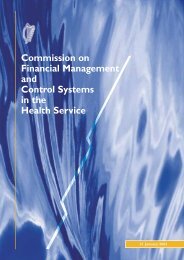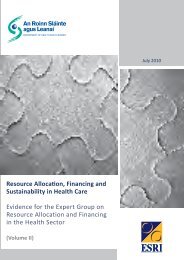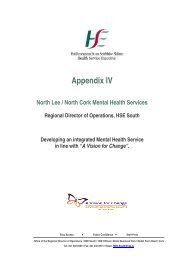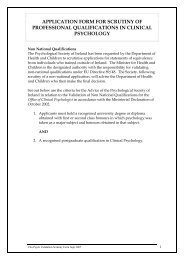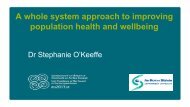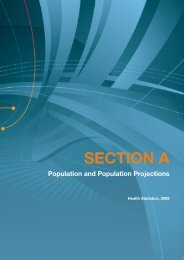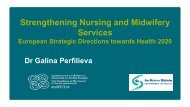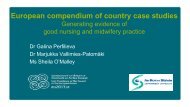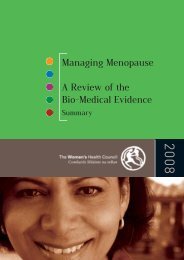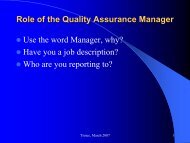All Ireland Traveller Health Study Our Geels - Department of Health ...
All Ireland Traveller Health Study Our Geels - Department of Health ...
All Ireland Traveller Health Study Our Geels - Department of Health ...
You also want an ePaper? Increase the reach of your titles
YUMPU automatically turns print PDFs into web optimized ePapers that Google loves.
<strong>All</strong> <strong>Ireland</strong> <strong>Traveller</strong> <strong>Health</strong> <strong>Study</strong><br />
10<br />
In Northern <strong>Ireland</strong> 42% <strong>of</strong> <strong>Traveller</strong>s live in social housing, 21% live on serviced sites, 9% live in privately<br />
rented housing, 6% live in privately owned housing, and 5% live in grouped accommodation. A further<br />
5% live in cooperated sites, 5% in transit sites and 7% on unauthorised sites (Northern <strong>Ireland</strong> Housing<br />
Executive, 2008).<br />
Education and Literacy<br />
<strong>Traveller</strong> organisations have for many years expressed concerns regarding <strong>Traveller</strong> education in terms<br />
<strong>of</strong> equality <strong>of</strong> outcomes, data collection, and lack <strong>of</strong> interculturalism in the curriculum. The 1995<br />
Task Force Report on the Travelling Community made 167 recommendations in the field <strong>of</strong> <strong>Traveller</strong><br />
education - more than half <strong>of</strong> the total number <strong>of</strong> recommendations in the report (Report <strong>of</strong> the Task<br />
Force on the Travelling Community, 1995). This reflected the massive need for change in the provisions<br />
that existed.<br />
<strong>Traveller</strong> educational status has been recorded repeatedly as considerably lower than that <strong>of</strong> their<br />
general peers, to an extent unmatched by any other community in Irish society. The 2006 census<br />
(Central Statistics Office, 2007c) revealed that 63.2% <strong>of</strong> <strong>Traveller</strong> children under the age <strong>of</strong> 15 had left<br />
school, compared to 13.3% nationally. Participation <strong>of</strong> <strong>Traveller</strong>s in higher education was 0.8% (8 in<br />
1,000). This compares to 30.2% (302 in a 1,000) <strong>of</strong> the national population. There are many possible<br />
explanations for this continued inequity. Advocates argue that it is difficult for <strong>Traveller</strong>s to see the<br />
positive outcomes in staying on in mainstream education as many <strong>Traveller</strong>s experience discrimination<br />
in trying to obtain employment (Danaher et al., 2009).<br />
There is a transgenerational issue, well established in the economics <strong>of</strong> education literature (Heckman,<br />
1974; Harmon and Walker 1995). When parents have poor literacy, they then are not able to read or<br />
interpret the child’s educational material or such literature as health instructions for taking medication.<br />
School policy must meet the challenges <strong>of</strong> attendance at school and assessment <strong>of</strong> children’s skills<br />
and abilities with allocation to the appropriate class situation. <strong>All</strong> too <strong>of</strong>ten in the past separate or even<br />
segregated teaching <strong>of</strong> <strong>Traveller</strong> children occurred and assumptions about intellectual capability were<br />
coloured by the child’s membership <strong>of</strong> the <strong>Traveller</strong> community. To address such factors the ‘Report<br />
and Recommendations for a <strong>Traveller</strong> Education Strategy’ was published in 2006, and proposed a<br />
5-year strategy to examine <strong>Traveller</strong> Education including education in preschool and the early years,<br />
primary, post-primary, further and adult education and third-level education. The primary goal <strong>of</strong> the<br />
strategy is to achieve equality for <strong>Traveller</strong>s in education, in terms <strong>of</strong> access, participation and outcomes<br />
(<strong>Department</strong> <strong>of</strong> Education, 2006).<br />
The ‘Report and Recommendations for a <strong>Traveller</strong> Education Strategy’<br />
• examines existing provisions and supports for <strong>Traveller</strong>s in education at all levels from preschool to<br />
higher education<br />
• identifies objectives for <strong>Traveller</strong> education, sets out plans <strong>of</strong> action, with suggested time scales<br />
• makes recommendations in relation to optimising or reallocating existing resources<br />
• sets out expected outcomes<br />
• addresses all aspects <strong>of</strong> <strong>Traveller</strong> education taking a holistic lifelong learning perspective from<br />
preschool provision to adult and continuing education.



